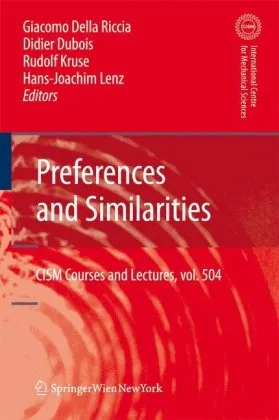Preferences and Similarities (CISM International Centre for Mechanical Sciences)
4.5
Reviews from our users

You Can Ask your questions from this book's AI after Login
Each download or ask from book AI costs 2 points. To earn more free points, please visit the Points Guide Page and complete some valuable actions.Preferences and Similarities: A Comprehensive Exploration
"Preferences and Similarities," part of the esteemed CISM International Centre for Mechanical Sciences series, delves into the intricate world of decision-making and classification. Authored by Giacomo Riccia, Didier Dubois, Hans-Joachim Lenz, and Rudolf Kruse, this book is an essential resource for researchers, academics, and practitioners seeking deeper insights into preference modeling and similarity assessment. By combining theoretical foundations, practical methodologies, and real-world applications, this scholarly work offers a multidimensional view of concepts that govern both human and machine decision-making processes.
Detailed Summary
At its core, "Preferences and Similarities" examines two fundamental aspects of decision-making systems: preferences and the concept of similarity. These constructs are pivotal for modeling phenomena ranging from individual decision-making to broader computational systems such as artificial intelligence and machine learning algorithms.
The book begins by discussing preference modeling, where the authors present mathematical frameworks for capturing and representing user preferences across various domains. Whether it's a consumer choosing between products or a recommendation system personalizing suggestions, preferences are inherently complex and subjective. The authors break down the logic and techniques necessary to quantify and analyze these subjective choices.
Next, the text dives into the realm of similarity, exploring how entities can be compared, grouped, and classified based on shared attributes. Topics such as fuzzy logic, probabilistic reasoning, and machine learning algorithms are thoroughly explored to demonstrate how similarity assessments are applied in modern-day technology and systems.
Practical examples and applied methodologies are interwoven throughout the book, making theoretical concepts accessible and actionable. From clustering techniques in data analysis to advanced preference-based decision-making tools, the content is designed to cater to a diverse audience of learners. By the end of the book, readers will have a strong understanding of how preference modeling and similarity assessment play crucial roles in solving complex problems in mechanical sciences and beyond.
Key Takeaways
- A detailed exploration of theoretical and practical frameworks for modeling preferences in decision-making systems.
- In-depth analysis of similarity assessment techniques using fuzzy logic, clustering, and probabilistic reasoning.
- Real-world examples that illustrate the application of concepts in fields ranging from artificial intelligence to mechanical sciences.
- Insights into the evolving role of preference and similarity metrics in solving multidisciplinary challenges.
- A balance of rigorous academic theory and hands-on, practical insights that cater to both beginners and seasoned professionals.
Famous Quotes from the Book
“Preferences and similarities are the cornerstones of both human intuition and computational intelligence, bridging subjective values with actionable metrics.”
“Understanding preference is more than grasping choice—it’s about building systems that respect human complexity.”
“Similarity is not just a way to compare entities; it’s a foundation for clustering, association, and knowledge extraction.”
Why This Book Matters
In an era where technology continues to advance at an incredible pace, understanding how preferences and similarity metrics operate is fundamental to shaping intelligent systems. Whether it's personalizing user experiences or clustering vast datasets for actionable insights, these concepts are indispensable to the modern world. "Preferences and Similarities" stands out as a definitive resource that brings together rigorous academic research and cutting-edge applications to simplify complex ideas.
This book does more than just educate—it inspires innovation by equipping researchers, engineers, and decision-makers with the tools to handle nuanced problems. Its depth, clarity, and emphasis on practicality make it uniquely valuable not just to the domain of mechanical sciences, but also to allied fields such as artificial intelligence, data science, and operational research. Whether you're a scholar looking to deepen your understanding or a practitioner in search of advanced tools, this book is a cornerstone for anyone invested in the interplay of human preferences and systematic decision-making.
Free Direct Download
You Can Download this book after Login
Accessing books through legal platforms and public libraries not only supports the rights of authors and publishers but also contributes to the sustainability of reading culture. Before downloading, please take a moment to consider these options.
Find this book on other platforms:
WorldCat helps you find books in libraries worldwide.
See ratings, reviews, and discussions on Goodreads.
Find and buy rare or used books on AbeBooks.
1114
بازدید4.5
امتیاز50
نظر98%
رضایتReviews:
4.5
Based on 0 users review
"کیفیت چاپ عالی بود، خیلی راضیام"
Questions & Answers
Ask questions about this book or help others by answering
No questions yet. Be the first to ask!


